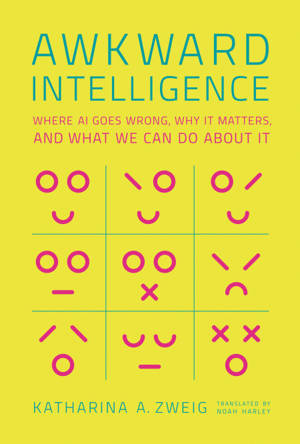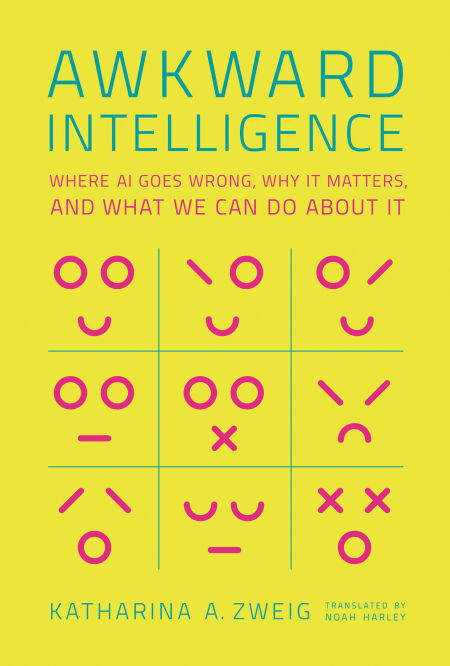
Bedankt voor het vertrouwen het afgelopen jaar! Om jou te bedanken bieden we GRATIS verzending (in België) aan op alles gedurende de hele maand januari.
- Afhalen na 1 uur in een winkel met voorraad
- In januari gratis thuislevering in België
- Ruim aanbod met 7 miljoen producten
Bedankt voor het vertrouwen het afgelopen jaar! Om jou te bedanken bieden we GRATIS verzending (in België) aan op alles gedurende de hele maand januari.
- Afhalen na 1 uur in een winkel met voorraad
- In januari gratis thuislevering in België
- Ruim aanbod met 7 miljoen producten
Zoeken
Awkward Intelligence E-BOOK
Where AI Goes Wrong, Why It Matters, and What We Can Do about It
Katharina A. Zweig
E-book | Engels
€ 29,52
+ 29 punten
Uitvoering
Omschrijving
INTERNATIONAL BESTSELLER: An artificial intelligence expert reveals the good—and the bad—about AI decision making, exploring the basics of AI ethics and AI design.
Before we know it, artificial intelligence (AI) will work its way into every corner of our lives, making decisions about, with, and for us. Is this a good thing? There’s a tendency to think that machines can be more “objective” than humans—can make better decisions about job applicants, for example, or risk assessments. In Awkward Intelligence, AI expert Katharina Zweig offers readers the inside story, explaining how many levers computer and data scientists must pull for AI’s supposedly objective decision making. She presents the good and the bad: AI is good at processing vast quantities of data that humans cannot—but it’s bad at making judgments about people.
AI is accurate at sifting through billions of websites to offer up the best results for our search queries and it has beaten reigning champions in games of chess and Go. But, drawing on her own research, Zweig shows how inaccurate AI is, for example, at predicting whether someone with a previous conviction will become a repeat offender. It’s no better than simple guesswork, and yet it’s used to determine people’s futures.
Zweig introduces readers to the basics of AI and presents a toolkit for designing AI systems. She explains algorithms, big data, and computer intelligence, and how they relate to one another. Finally, she explores the ethics of AI and how we can shape the process.
Before we know it, artificial intelligence (AI) will work its way into every corner of our lives, making decisions about, with, and for us. Is this a good thing? There’s a tendency to think that machines can be more “objective” than humans—can make better decisions about job applicants, for example, or risk assessments. In Awkward Intelligence, AI expert Katharina Zweig offers readers the inside story, explaining how many levers computer and data scientists must pull for AI’s supposedly objective decision making. She presents the good and the bad: AI is good at processing vast quantities of data that humans cannot—but it’s bad at making judgments about people.
AI is accurate at sifting through billions of websites to offer up the best results for our search queries and it has beaten reigning champions in games of chess and Go. But, drawing on her own research, Zweig shows how inaccurate AI is, for example, at predicting whether someone with a previous conviction will become a repeat offender. It’s no better than simple guesswork, and yet it’s used to determine people’s futures.
Zweig introduces readers to the basics of AI and presents a toolkit for designing AI systems. She explains algorithms, big data, and computer intelligence, and how they relate to one another. Finally, she explores the ethics of AI and how we can shape the process.
Specificaties
Betrokkenen
- Auteur(s):
- Vertaler(s):
- Uitgeverij:
Inhoud
- Aantal bladzijden:
- 288
- Taal:
- Engels
Eigenschappen
- Productcode (EAN):
- 9780262371865
- Verschijningsdatum:
- 24/10/2022
- Uitvoering:
- E-book
- Beveiligd met:
- Adobe DRM
- Formaat:
- ePub

Alleen bij Standaard Boekhandel
+ 29 punten op je klantenkaart van Standaard Boekhandel
Beoordelingen
We publiceren alleen reviews die voldoen aan de voorwaarden voor reviews. Bekijk onze voorwaarden voor reviews.









